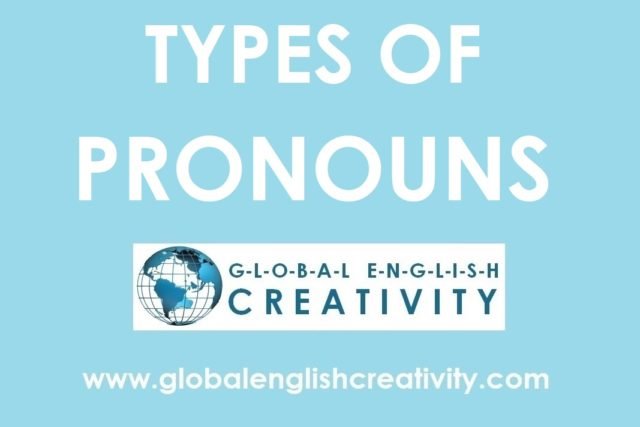| PRONOUN |
Pronoun is the word which is used instead of noun or noun phrase. It takes the place of a noun.
e.g. I, we, you, you, he, she, it, they, my, these, whom, some etc.
| TYPES OF PRONOUNS |
| Personal Pronouns A Pronoun that indicates a word used as substitute for a particular person. They are used as subject, object or complement. e.g. I, you, he, she, it, we they, me, him, her, us, them etc. I was not aware of the fact. I apologize for my ignorance. Mary is very polite and she never misbehaves with anybody. You have been doing such silly mistakes for years. John is not feeling well, so he is taking rest. We had gone out of station for few days last week. Jack and John are so spoilt boys, they always make fun of others. It is your responsibility to take care of all these things. I will teach him a lesson one day or other, come what may! Could you please, help me out? He has been preying on my mind for a long, please do something. She could not dare to tell her parents that she had failed in the exam. Please, do this favour to us, we really need your help in this situation. Clara is shifting elsewhere as her landlord asked her to vacate the place. Would you please, pass it on to them? It was best of the time, it was worst of the time. Are you trying to be over-smart with me, aren’t you? We will not tell him anything of this, rest assured. They all were bed-ridden, I was not able to see that pathetic sight. Let me know what the problem is. It hurt us so badly that we could never trust him again. |
| Possessive Pronouns A Pronoun that indicates the possession or ownership in a phrase or sentence. It shows that something belongs to someone. e.g. my, our, your, his, her, its, their, mine, ours, yours, hers, theirs etc. She is my only daughter, so cute and naughty! It was thoroughly their fault, I can’t help it. Your house is larger than ours. She realised her mistake afterwards, and begged his pardon. This hand-bag is mine, don’t even touch it. That tree is bearing tamarind all over, its tamarind is so sweet and sour. Those boys were playing here, this must be theirs bag only. Ours is a very big college in the city. His job is really strenuous. I forgot to wish her on her birthday. He was not ready to listen to his parents at any cost. This dress was a dark pink previously, but now, its colour is fading. It is merely yours responsibility to study properly. My schedule these days, is very busy. Here it is, your coffee! Their house is locked out for many days. Her mobile phone is costlier than his. It is my humble request to you. That car is very attractive, its colour is bright too. |
| Reflexive Pronouns A Pronoun that refers or reflects back to the subject of a sentence or clause. It is used as a direct object. e.g. myself, yourself, himself, herself, oneself, itself, ourselves, yourselves, themselves etc. I will myself go there and make sure that everything is fine. He could not do it himself and had to take a help of others. You have to register yourselves for the course without fail. We must do all things ourselves to become independent. Unfortunately, Mary broke her leg, so she could not walk herself. Many times, I go to college by myself. Students themselves need to do a lot of self-study. I talked to the bank manager himself, and he is ready to help us. My laptop is not working properly, it turns itself off now and then. John himself cut his finger when he was chopping onion for breakfast. What do you think yourself to be? We enjoyed a lot ourselves at the party last night. She herself made a mistake in the exam and is now blaming others. We must take care of ourselves during this pandemic. Just peep into yourself and ask, what you are exactly. They must find out the solutions to this problem themselves. He must do something to establish himself as a successful person. One must learn to be by oneself some times. You should be able to say everything yourself. We ourselves were very frightened by that snake. |
| Relative Pronouns A pronoun that indicates the connection of clause or phrase with noun or pronoun. They are introduced relatively or dependently. e.g. that, who, whom, whose, which, when, where etc. The book which I read yesterday is misplaced. Perhaps, I know this woods whose owner resides in the nearby village. Eventually, I found out a shop that I had been looking for a long. That man is my husband who is wearing a black shirt. I don’t know where this road exactly goes. She is my sister whom you insulted that day. This is what you wanted to tell me then. I have no idea whom this wallet belongs to. She can’t tell anything about when he will get back home. We apologized to them whose window glass we had broken while playing cricket. That is the car, I saw at the crime place. Can you tell me who this man is? Whichever option you choose, you will lose definitely. You can’t get whatever you want without hard work. This is the same lady whom I met yesterday in the park. This is the pen that I had lost before some time. Please share with me what is going on your mind. Make a habit that you read every day. That is where I wanted to go. Do you remember what your address is? |
| Reciprocal Pronouns A Pronoun that indicates the mutual sharing of something in person or persons. It is used to identify an action or feeling. e.g. each other, one another They take a proper care of each other. We asked questions one another to check our knowledge. Mary and Jerry always fight with each other. All must respect one another. Why don’t you trust each other? They couldn’t see each other clearly from distance. We sent one another greeting cards for Christmas. Those friends didn’t even look at each other. They helped to complete each other’s homework. We exchanged one another’s cellphones. They banged heads of each other in the fight. Husband and wife must understand each other well to go smoothly. Jane and Lydia wore each other’s dress at the party. Portia and Bassanio loved each other deeply. You should not call names one another. Jack and Clara talk to each other on phone daily. We must maintain one another’s dignity. They both hated each other a lot. We were fighting one another. You should hold each other’s hand while going to school. |
| Demonstrative Pronouns A Pronoun that indicates something specific, replacing noun. It shows the distance and difference between two things. e.g. this, that, these, those, such, none, neither etc. Can I have this pencil, please? That man was so arrogant. Those were really golden days! None of these answers is correct. I can’t stand, such is her arrogance! Neither of the boys is reliable. These fruits are really fresh. That is your choice, what can I do? This is my mother’s wrist-watch I am wearing. It is none of your business. Those people are illiterate. Such things are not allowed here. This is the best decision you have made. After all, that was my dream! Neither of the pens is working, what to do now! This is my house, I will take care of everything. These are nice colours, aren’t they? That door is so creaky. Such is the chaos here, I can’t hear anything! How is that? |
| Indefinite Pronouns A Pronoun that indicates one or more uncertain objects, beings, or places. They do not indicate the specific thing. e.g. all, any, more, most, both, few, many, neither, none, each, every, some, anyone, nobody etc. All human beings are mortal. Some books are read, very few are digested. Anyone who has done this must come forward. Nobody cares! Everything happens for a reason. Many people are suffering from Omicron. No one knows what happened there. Most of them were copying during the examination. Good- bye, everyone! Someone was peeping through the window. Nothing will happen, if you just sit idly. I would like to have anything you offer with love. Both of them were involved in the scam. Everybody knows how to behave at public places. Neither he nor his brother helped me out. You have to teach each one. She likes either tea or coffee. There are some chocolates for you on the table. All must abide by rules and regulations. I want to do something to prove my caliber. |
| Interrogative Pronouns A Pronoun that indicates a word used to ask a question or to get information. There are only five Interrogative Pronouns in English. e.g. what, who, which, whom, and whose. What do you want for breakfast? What are you doing so hastily? What will you do after getting free? What time am I supposed to come there? Which is your favourite song? Whom did you call up to? Whose books are these? I wonder what will happen tomorrow. What gift do you want for your birthday? She asked which the classroom is for the first year. I want to know what happened there. What was the reason for coming late today? Which is your bag? Who was riding a bike yesterday? Who is that boy you were talking to before some time? You should ask what the protocol is. What brings you here? Who is your best friend in the school? Whose child is this? What would you like to have? |









































My family every time say that I am killing my time here at web,
except I know I am getting experience all the time by reading thes pleasant articles.